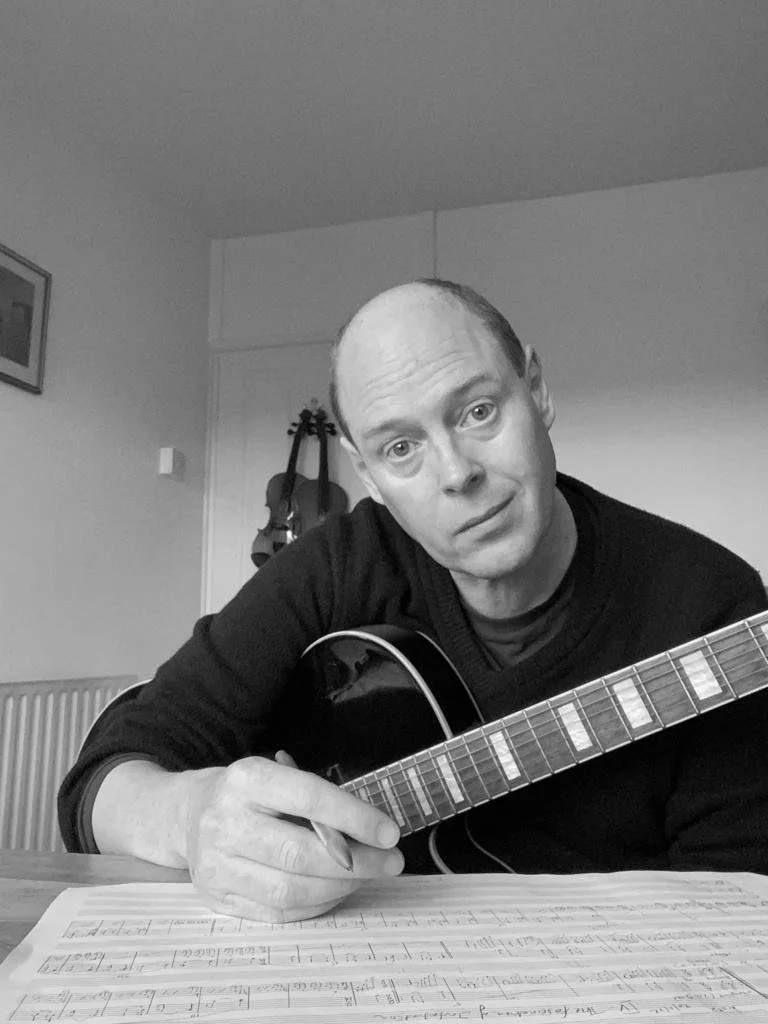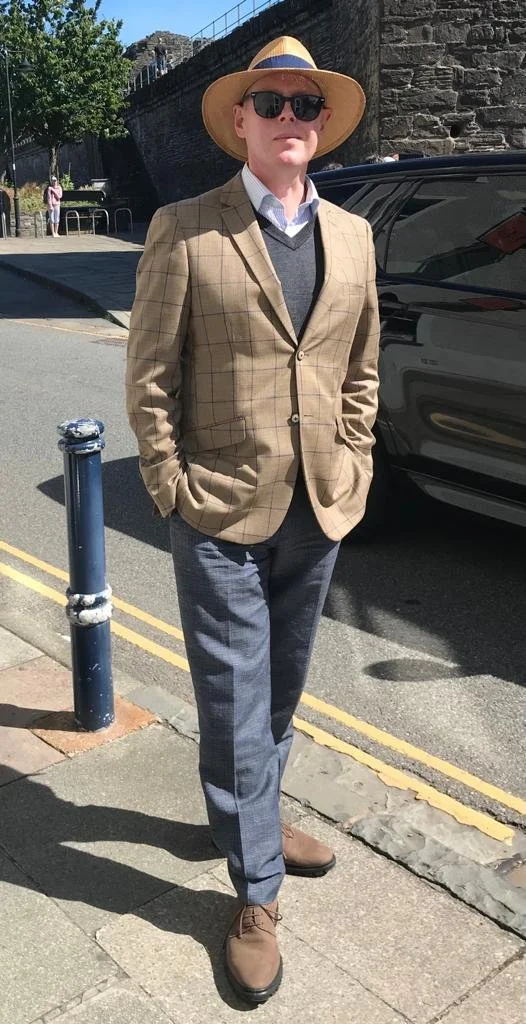Musical Mavericks - December 2022 - David Braid
My first question off the bat, is how have you managed to keep producing your music - in the sense of keeping your hunger for creating and putting your music out there in what today has become such a saturated and even hostile environment for contemporary composers.
Good question, there are two jobs for a composer:
• Writing the music
• Getting this music into others’ minds via their ears
Regarding the first issue; I need nothing more than a pencil, paper and guitar (I don’t even really need the guitar so much now – I just like them!).
The compulsion to write music has always been with me and has only become stronger over the 42 years I’ve been doing it as each new work/life experience throws up another ‘what if?’ which can only be answered by another piece.
The second issue is only difficult in that involves other people, plus their time and goodwill; which to be honest I find is far more present and available than one may think.
In my late 20s I made the most sensible decision of my life and separated the two issues of: a) making a living and b) composing, and found a way to make a modest but steady income that is entirely separate from music.
I got the idea to do this from Ives, Kafka, and Gesualdo; unlike this composer I haven’t needed to murder anyone.
Up until then I had been a truly atrocious guitar teacher: “It goes like this – what’s wrong with you?” I know… …sorry kids, but at least I told you all about sharks, languages, astronomy and Star Wars in the lessons instead.
This decision to ‘separate economy and art’ has given me 100% freedom to write what I want and, as time goes by, some means to make things happen.
I initially put all my energies and funds into making numerous recordings, later on starting a number of ensembles and putting on my own concerts around London at major venues.
After my most recent, five-year, and full-on, run of the latter, I’m now going back into studio mode for a year or so to record the other 140 works of mine I’ve not yet recorded.
In the final analysis – given the many platforms to sell your music at a fair price, such as Bandcamp - plus those where you can give it away if you like - such as Spotify (their CEO really needs a new Aston Martin) - plus the incredible level that technology has now reached - the old composer’s whine of, “No one plays or hears my work” is now no longer valid or even slightly excusable.
You can write, record and release your work to the entire world with no barrier at all.
You no longer need to have gone to the right school to get a Proms commission, nor toe the Apartheid line of the demeaning (to minorities – I am one) cult of wokism. We human beings are so much more than just our sex, race or class. To award opportunity on these bases is de-humanising.
So, I would say to any composer now – unless of course you feel that the state owes you a living because you choose to have the immense privilege of being an artist (some people believe this still, amazingly) – when you feel the world is ignoring your music, look in the mirror – the answer to your problem is looking right at you.
How do you see things in twenty years with platforms such as Spotify and how people listen to music?
Spotify and other similar companies have an entirely unsustainable business model – no one can expect to have a factory making a product where its workers are not paid – not if you want quality.
Look at the mindless pap that makes up 97% of their releases if you want proof of this.
Much of what they release now is third-rate, made by themselves and recorded by anonymous musicians.
That is not art, it is cynical exploitation, of both musicians and the public.
There are already numerous political moves in many countries to address this issue.
If, for example, they were legally required to operate as broadcasters, then their having to buy a PRS licence would cover at least the composers to an extent, with a similar PPL licence doing the same for performers.
The main solution is education – which should be free and untouched by ideology – if Germany can do it then so can the UK.
Educate the public properly and you won’t need any state funding for new work. Older art such as that in museums, or ballet and opera, need to be supported; but not new music.
If you can’t be so good as to inspire the public with your music then you simply don’t deserve their money.
It is not a coincidence that the greatest music ever written occurred at a time when state funding did not exist. Private patronage is far better, as it provides a real quality filter, when you pay - you care.
Why exactly should our taxes be used for inexperienced self-indulgent composers (who nearly always come from highly privileged backgrounds anyway) to experiment on a public that hates this stuff and would rather go to the cinema and see a truly alive and relevant modern art form made in Hollywood?
It is entirely unjustifiable; PLUS – the while idea of ‘novelty’, ‘ground-breaking’, ‘genre-smashing’, etc. is so completely provincial and dated (a 1950s idea) and quite frankly just lazy-minded.
The new truly modern challenge we have now is quality – let’s see how good a piece you can write; not how ugly you can make it – the latter is easy and common (in every sense of the word) and so conservative as to be laughable.
If you’re an atonal modernist you are writing period music, you may as well do madrigals.
Some may say “Oh, but Beethoven was not understood in his day” – this is not true in the slightest.
He was loved and, being the master he was, never demanded so much from his audiences that they were unable to follow the logic of his music – even if it first it was slightly unfamiliar.
He was understood alright. He had 14,000 people at his funeral!
As to how people listen – that is interesting sociologically. The Walkman from the 80s set an early precedent for hearing music anywhere – now the norm – which has largely killed off the idea of any subtlety in dynamics – while being great news for manufacturers of compressors of course!
Noise cancelling earphones are limited in their ability, but more importantly, it’s an issue of focus.
Music is ubiquitously listened to while doing something else, cycling, walking, eating; this removes a large market for subtle, narrative and longer, subtle works.
I get it – we’re all busy – who do you know with a hobby? But still… if you just stop and listen then your quality bar will rise, and quickly too.
Music that can move the soul has a strong future but requires some commitment by listeners. I am optimistic, I see so many people in their 20s getting into the Hipster thing. Hipsters are just the new version of the Arts and Crafts movement and are a good thing.
These people in their 20s want to do pottery, watercolours, weaving, knitting, ukulele playing - this is really good and is already showing its value in music.
Look at the numerous East-end classical concert series going on right now; halls filling to capacity to hear classical cellists! – I’ve seen queues down the street in Hackney with my own eyes this year.
You just have to market it correctly; let people bring their beers in, give them a club experience after so they stay for the evening; it’s so obvious that people love music.
So, human curiosity will surpass the momentary pleasure of the 3-minute pop song. I have no problem with the latter, I’ve written dozens of them, but they are one tiny fraction of a percent of what music really is.
If literature was like the music world (I mean the whole industry of all genres) 99% of published books would be one-page stories about sex, with novels about anything else occupying a tiny aloof area and insulted by the media as ‘elitist’ and ‘difficult’.
Modern pop music is to serious music, what pornography is to love, or etch-a-sketch to art.
That is how utterly absurd and brainless the mainstream music industry has become.
Yet still, I remain optimistic, I believe in people, not ideologies or governments.
People love good music when they hear it – it’s that simple. Our job as musicians is to ensure that they can access it if they choose to.
It’s up to us what things will be like in 20 years; I intend to make them better where I can.
Can you describe the kind of music you write?
Yes: melodic, immediately effective, clear, emotionally powerful and repeatable.
This was not always the case though; like so many, I was infected with the now-ancient ailment of ‘atonal modernism’ at the Royal College of Music; the cultural guardians of that time disallowed d-minor of course.
I cured myself (eventually) of this with more education – largely done by simply listening to the best music ever written, buying the scores and working out myself how they function.
Thank you David. Do you imagine ideas first and then try them, or is it much more hands on?
It’s a two-way street to be honest.
Like you, I love just picking up my guitar and noodling around. Having happily let my classical guitar repertoire slip away (to those who can really play it) this is now always improvisation.
For example, I refer to my Fender Jaguar guitar as my ‘Ideas Generator’ – as that is largely its function.
When I have proper full composing days – I then use what I remember of these guitar ‘noodlings’ I did in the evenings as a basis for my pieces. The ones I forget were not worth remembering.
I then make a loose decision on what instruments will present these ideas in the clearest and most natural way and work in just two or three staves at most.
These consists of two sustaining instruments (high and low) with the guitar (piano, vibes, organ) as a harmonic core, holding it together.
Once the work itself is complete – usually taking two-to-three days at most for a six-minute piece – I will then score it up in detail and settle on final instruments.
This is dependent on whether it is for performance and recording, or just the latter. If it’s for performance then I will use an ensemble I’ve used for another few pieces so as to make up a concert’s worth of material.
If only for recording, then I will play most, or all, of the instruments myself on the recording and add what I want as I go; this leaves enough freedom to catch the momentary spark while not having to mess with the notes or structure, about which I am quite strict; otherwise, one just has meandering improvisation.
The actual composition process is very simple for me (now anyway – not so when I was atonally-infected in the 90s).
I play a phrase or chord then stop and listen. I literally then hear the next phrase in my head as clear as a recording, I then write that down.
I keep doing this until I’m either exhausted or I finish the piece. That’s it – just that, nothing else. No plans. No harmonic systems. No conceptual BS. No academic justification. No ideology.
What are the advantages to writing music that is for smaller ensembles?
Each player can bring more to the piece and can be heard clearly as an individual musician. I trust the musicians I work with now completely. They always bring so many ideas and bring out things in the music that I did not consciously put in. I’m so lucky to have this large pool of players across London that are happy to work with me.
Oh and it’s cheaper than a large ensemble!
What are you currently working on?
A seven-movement work about major life experiences; hopefully universal. I’m over half-way through now.
Unlike my last large work, Journey Time, this one has no words and is entirely instrumental.
The group will probably be something like various electric guitars (plus effects), Hammond organ, clarinet, viola, bassoon and mandolin, and whatever else I have lying around my studio.
This one is for recording only; however, as with all my work, it is very straightforward and could easily be performed in concert once arranged and score up – which would take a day at most.
What ‘bucket list’ entries have you not yet fulfilled?
I would have said just six months ago, “the other 6 symphonies I have yet to write – as I’ve only done three”
but…
… I’m not sure that really matters now – symphonies are, of course, as culturally-neutral as a fugue – but the very fact of making the statement of writing one is so very ‘classical’ and slightly prim and tweedy (the statement itself I mean) that I find it a bit off-putting.
I make no claim to be a ‘classical composer’ – I’m just a bloke in 2022 writing some tunes that I hear in my head.
The very word ‘classical’ (with a small ‘c’) only means music good enough to last past the time it was created – it’s too early to say that about me until around 2198 AD at least!
What advice would you give to young composers who are not running with the herd and doing what everyone else is doing
Perhaps slightly brutally I would say this: Ignore all fashions and fads completely and listen to your own inner musical ideas.
If you don’t hear any, or there appears to be a void in that part of your mind/soul, then master an instrument or two, start a band, or jam with a friend to see if you can wake it up.
Failing that, be really honest with yourself and do something more useful for the world like being a doctor, nurse, or research scientist.
The truly natural composer won’t find this discouraging.
Information about David can be found at
https://linktr.ee/davidbraid


